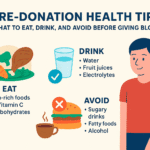Heart disease remains one of the leading causes of death worldwide. While diet, exercise, and lifestyle choices play a major role in maintaining a healthy heart, there’s an often-overlooked activity that can have a surprising positive impact on cardiovascular health — donating blood. Beyond the obvious life-saving benefits for recipients, regular blood donation can also offer measurable health benefits for donors, including reducing the risk of heart disease.
The Connection Between Blood Donation and Heart Health
The link between blood donation and heart health primarily revolves around iron levels in the blood. Iron is a vital mineral necessary for many bodily functions, including the production of red blood cells. However, excessive iron in the body can contribute to oxidative stress, a condition that damages cells and tissues. Oxidative stress is closely linked to the development of cardiovascular diseases, including heart attacks and strokes.
Regular blood donation helps lower iron stores in the body, reducing oxidative stress and, in turn, protecting the heart. Studies have shown that individuals who donate blood regularly tend to have lower risks of heart attacks compared to those who never donate.
Reducing Blood Viscosity
Another factor contributing to heart disease is high blood viscosity — essentially, thick or “sticky” blood. Thick blood forces the heart to work harder to pump it throughout the body, increasing blood pressure and straining the cardiovascular system. By donating blood, you reduce blood volume and temporarily lower the concentration of red blood cells, improving blood flow and reducing heart strain.
Improved Cholesterol Levels
Emerging research also suggests that regular blood donation can positively influence cholesterol levels. Donating blood may help reduce low-density lipoprotein (LDL) cholesterol, often referred to as “bad cholesterol,” which is a key contributor to plaque buildup in arteries. Maintaining healthy cholesterol levels is crucial for preventing atherosclerosis — the narrowing and hardening of arteries that can lead to heart attacks.
Additional Health Benefits of Blood Donation
While the cardiovascular benefits are significant, donating blood comes with other perks for overall health:
-
Calorie Burn: A single blood donation can burn approximately 650 calories.
-
Early Health Screening: Every donor undergoes a basic health checkup, which includes monitoring blood pressure, hemoglobin levels, and overall fitness.
-
Mental Well-being: Helping others in need can boost mental health, reduce stress, and promote a sense of community and purpose.
How Often Should You Donate Blood?
For adults in good health, donating whole blood every 8–12 weeks is considered safe. It’s important to stay hydrated, eat a nutritious meal before donation, and ensure you meet eligibility criteria set by your local blood bank. Regular donations can help maintain healthy iron levels while maximizing the cardiovascular benefits.
Conclusion
While donating blood is primarily an act of generosity that saves lives, it also offers remarkable heart health benefits for the donor. By lowering iron levels, improving blood flow, and positively influencing cholesterol, regular blood donation can play a role in reducing the risk of heart disease.
If you’re eligible, consider making blood donation a routine part of your health regimen. Not only will you be giving the gift of life to someone in need, but you’ll also be taking proactive steps toward a healthier heart.


